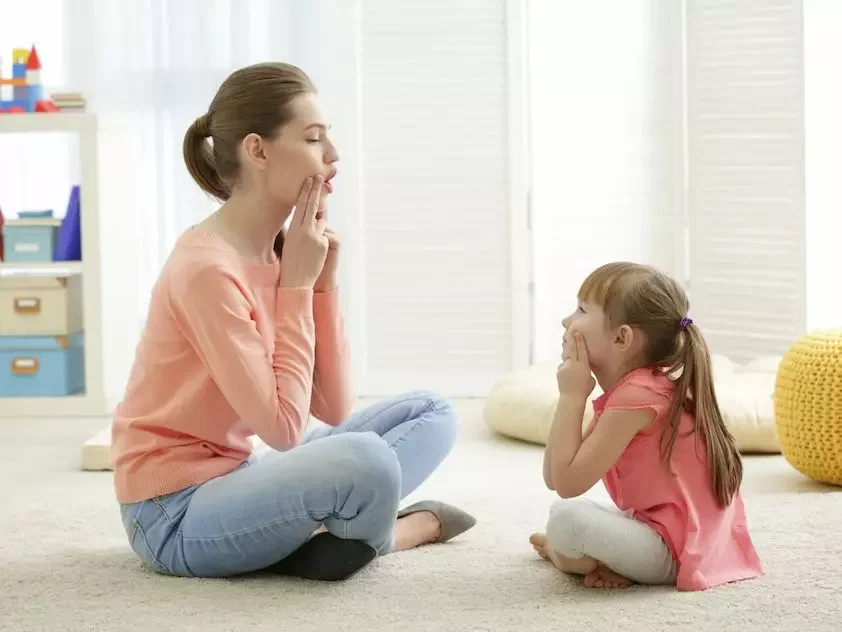Tips to get Late Talkers talking!
Is my child a “late talker?”
Many parents worry when their toddler says only a few words—or none at all. At 2 years of age, most kids will be able to say around 200 words, and begin stringing them together (ie. mommy up, more please, go out, etc.). If your child uses fewer than 5–10 words or is hard to understand, it may be the sign of a language delay or a language impairment. There are simple, everyday strategies you can use to encourage language growth.
These ideas don’t require flashcards or special programs—just your voice, connection, and daily routines.
Self-Talk & Parallel-Talk
One of the best ways to help your child talk is to narrate what you’re doing. Bathe your child in language by describing what you are doing all day long
Say things like:
“I’m washing the dishes.”
“This water is really hot!”
“Let’s go find your shoes. Here they are!”
Similarly, you can talk about what your child is doing (parallel talk). This gives your toddler lots of language models to hear and learn from, and they know you’re paying attention to them! Here are some examples:
“You are driving your car up the hill! You are driving it fast!”
“Oh, you want the blue playdough.”
“You found a blue sock. Maybe I can find the other.”
💡 Tip: Get down to their eye level so they can see your face, lips, and expressions.
Give Choices and Wait
Most late-talkers are pretty good at answering Yes/No questions by nodding or shaking their heads. Instead, offer them 2 simple choices—for example: “Do you want the red cup or the blue cup?” This not only helps them learn new words but encourages them to use their voice to answer.
After giving them the choices, simplify it to their level: “red or blue?” and then….WAIT! (Look at them expectantly, but don’t give them anything). Giving them a short pause after you speak allows them a moment to process and respond. If you’ve waited for 4-5 seconds, and they don’t respond, repeat the choices and WAIT! Here is what an exchange could look like:
me: “do you want the blue or red cup?” (wait and look expectantly)
child: no response
me: “do you want blue or red?” (wait)
child: grabs at the red cup
me: “oh, you want red. You try it: red.”
child: grabs at the red cup
me: “okay, say red please” (wait and hold up the red cup)
child: “please”
me: give him the cup
Even if they don’t use words yet, they might gesture, make a sound, or point. I always like kids to say or use the ASL sign for ‘please’ if they don’t attempt one of the new words.
✨ Why it works: Kids need time to organize their thoughts before they speak. Silence can actually be powerful!
Play and Sing Together 🎵🧸
Play is your toddler’s language classroom. You can:
Read books with simple, repetitive text. Point to pictures and talk about what you see.
Sing songs and nursery rhymes, which help kids learn how words sound and flow.
Follow their lead in play. If they love trains, talk about “train,” “go,” “stop,” and “track.”
Use visual cues like pointing or gestures to make new words meaningful.
Try bubble play—it’s fun and encourages kids to request “more,” “pop,” or “bubbles!”
🎤 Singing and playing give kids a fun, low-pressure way to experiment with sounds and words.
Build on What They Say 🧩
Extensions are adding words on to what your child already says. For instances, if your toddler only says single words, like “ball,” you can respond with 1-2 more words to add detail:
“Yes! A big ball.”
“Red ball!”
“Throw the ball!”’
If your child says “milk,” you can say:
“You want more milk.”
“Milk please!”
“yummy milk”
This is called expanding—you’re adding just a little more to what they say. It helps them hear how words fit together in sentences and grows their vocabulary naturally.
Model—Don’t Correct 🪄
When your toddler mispronounces or makes up a word, try modeling the correct version, for example:
Child: “He goed out the door!”
Adult: “Yes, the man went out the door. He went so fast! He went out to his car”
This keeps the conversation positive and encouraging. Over time, your child will begin to use the correct forms themselves.
A Final Word of Encouragement 🌱
Supporting your toddler’s speech doesn’t need to be complicated. Talk, play, pause, sing, and build on their words. Over time, these small steps make a big difference.
If you’re concerned about your child’s language development, consider talking with a speech-language pathologist. We offer free 15-minute over the phone consultations to determine if a speech evaluation is warranted. Give us a call! 385-246-2684 or email at info@coppermountainspeech.com
📚 For more information and helpful resources, check out:



